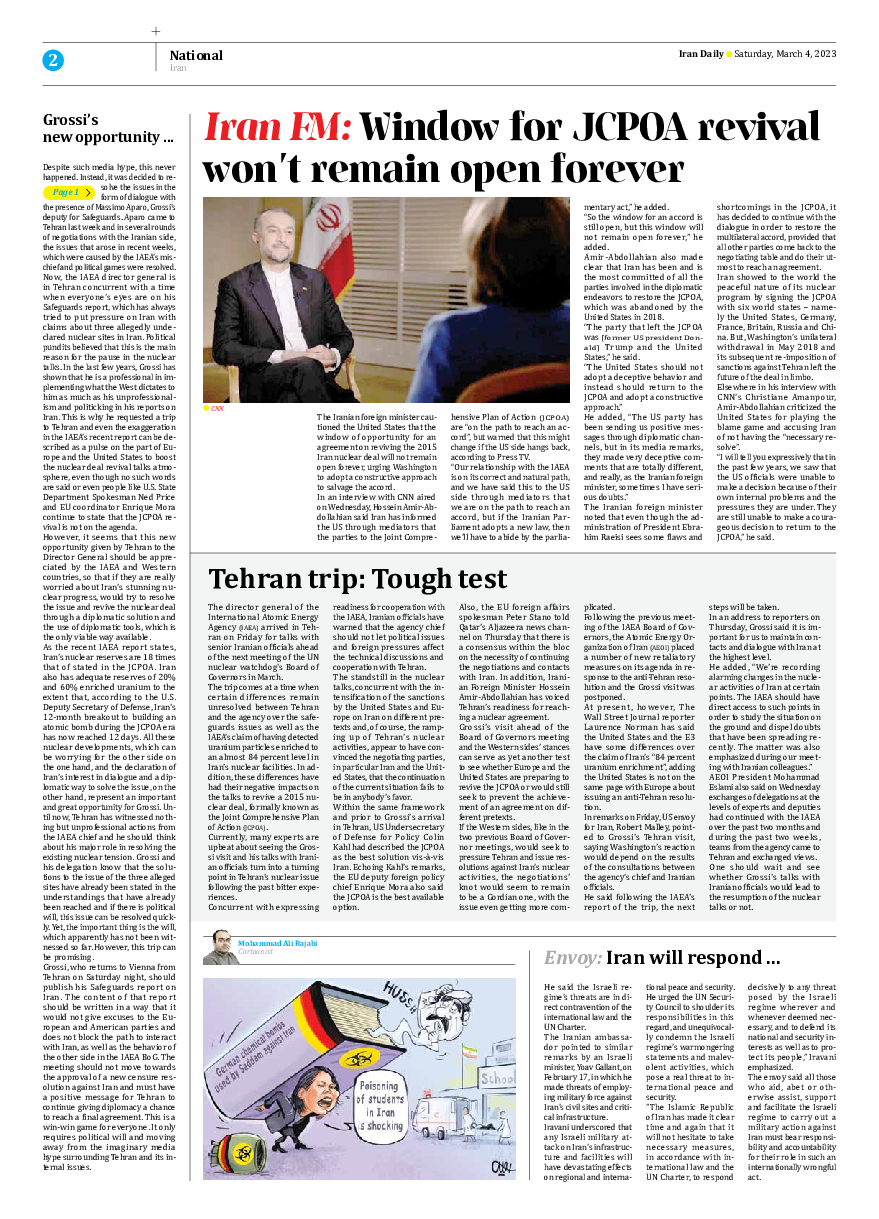
Tehran trip: Tough test
The director general of the International Atomic Energy Agency (IAEA) arrived in Tehran on Friday for talks with senior Iranian officials ahead of the next meeting of the UN nuclear watchdog’s Board of Governors in March.
The trip comes at a time when certain differences remain unresolved between Tehran and the agency over the safeguards issues as well as the IAEA’s claim of having detected uranium particles enriched to an almost 84 percent level in Iran’s nuclear facilities. In addition, these differences have had their negative impacts on the talks to revive a 2015 nuclear deal, formally known as the Joint Comprehensive Plan of Action (JCPOA).
Currently, many experts are upbeat about seeing the Grossi visit and his talks with Iranian officials turn into a turning point in Tehran’s nuclear issue following the past bitter experiences.
Concurrent with expressing readiness for cooperation with the IAEA, Iranian officials have warned that the agency chief should not let political issues and foreign pressures affect the technical discussions and cooperation with Tehran.
The standstill in the nuclear talks, concurrent with the intensification of the sanctions by the United States and Europe on Iran on different pretexts and, of course, the ramping up of Tehran’s nuclear activities, appear to have convinced the negotiating parties, in particular Iran and the United States, that the continuation of the current situation fails to be in anybody’s favor.
Within the same framework and prior to Grossi’s arrival in Tehran, US Undersecretary of Defense for Policy Colin Kahl had described the JCPOA as the best solution vis-à-vis Iran. Echoing Kahl’s remarks, the EU deputy foreign policy chief Enrique Mora also said the JCPOA is the best available option.
Also, the EU foreign affairs spokesman Peter Stano told Qatar’s Aljazeera news channel on Thursday that there is a consensus within the bloc on the necessity of continuing the negotiations and contacts with Iran. In addition, Iranian Foreign Minister Hossein Amir-Abdollahian has voiced Tehran’s readiness for reaching a nuclear agreement.
Grossi’s visit ahead of the Board of Governors meeting and the Western sides’ stances can serve as yet another test to see whether Europe and the United States are preparing to revive the JCPOA or would still seek to prevent the achievement of an agreement on different pretexts.
If the Western sides, like in the two previous Board of Governor meetings, would seek to pressure Tehran and issue resolutions against Iran’s nuclear activities, the negotiations’ knot would seem to remain to be a Gordian one, with the issue even getting more complicated.
Following the previous meeting of the IAEA Board of Governors, the Atomic Energy Organization of Iran (AEOI) placed a number of new retaliatory measures on its agenda in response to the anti-Tehran resolution and the Grossi visit was postponed.
At present, however, The Wall Street Journal reporter Laurence Norman has said the United States and the E3 have some differences over the claim of Iran’s “84 percent uranium enrichment”, adding the United States is not on the same page with Europe about issuing an anti-Tehran resolution.
In remarks on Friday, US envoy for Iran, Robert Malley, pointed to Grossi’s Tehran visit, saying Washington’s reaction would depend on the results of the consultations between the agency’s chief and Iranian officials.
He said following the IAEA’s report of the trip, the next steps will be taken.
In an address to reporters on Thursday, Grossi said it is important for us to maintain contacts and dialogue with Iran at the highest level.
He added, “We’re recording alarming changes in the nuclear activities of Iran at certain points. The IAEA should have direct access to such points in order to study the situation on the ground and dispel doubts that have been spreading recently. The matter was also emphasized during our meeting with Iranian colleagues.”
AEOI President Mohammad Eslami also said on Wednesday exchanges of delegations at the levels of experts and deputies had continued with the IAEA over the past two months and during the past two weeks, teams from the agency came to Tehran and exchanged views.
One should wait and see whether Grossi’s talks with Iranian officials would lead to the resumption of the nuclear talks or not.







